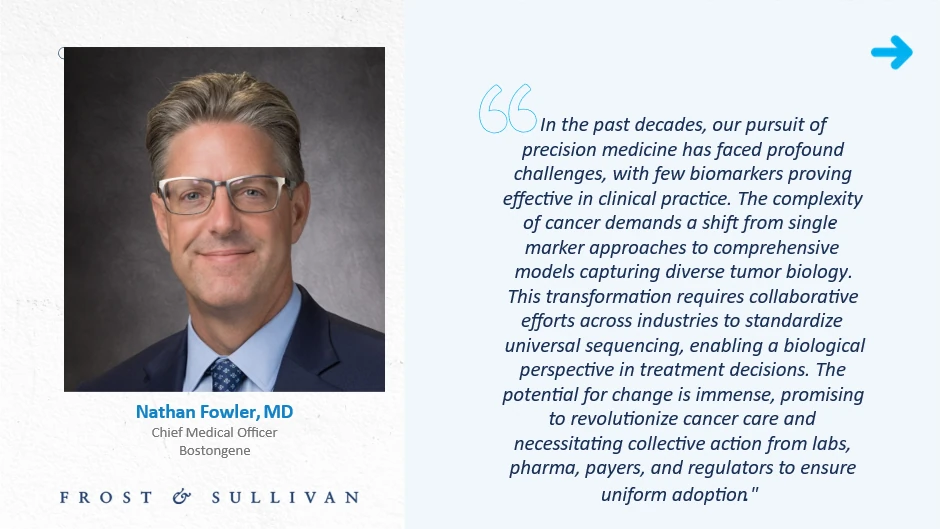The precision oncology landscape is evolving with technologies like artificial intelligence (AI), machine learning (ML), robotics, and big data-driven multi-omics tools, advancing targeted treatments. Experts, including oncologists, decision-support scientists, and healthcare professionals, are currently navigating the complex process of identifying biomarker correlations based on a patient’s genetic makeup. This ongoing transformation is equipping oncologists with tools for personalized diagnosis and treatment. Nevertheless, challenges persist in acquiring and managing high-quality biomaterials and organizing clinical data.
Frost & Sullivan’s Precision Health Think Tank series delved into the fascinating realm of “Strategic Positioning in Precision Health: Competitive Strategies Transforming the Precision Oncology Ecosystem.” This engaging discussion yielded pivotal contributions that are shaping the future of the industry, thanks to the collaborative efforts of visionary experts.
The following experts collectively brainstormed to craft transformative perspectives:
Alexa Woodward, Partnerships & Strategy Manager, Clinicogenomics, Optum; Devmanyu Singh, Integrated Health Solutions Lead, Roche; Nathan Fowler, M.D., Chief Medical Officer, Bostongene; Courtney Thornely, Senior Therapeutic Strategy Manager, Novotech; Unmesh Lal, Growth Coach and Research Director, Frost & Sullivan; and Surbhi Gupta, Growth Expert & Industry Principal, Frost & Sullivan.
Note: Gain valuable perspectives from these industry experts by clicking here to access the recorded session of the Think Tank.
What were the growth opportunities discussed during the think tank?
- Enhancing Biomarker Precision: Biomarkers have huge potential for transforming cancer care, but current ones are limited or not impactful enough. We need more inclusive and precise biomarkers, covering diverse tumor biology elements, including signals from a variety of genes, mutations, and the tumor’s microenvironment, to improve response prediction.
- Advancing Precision Oncology: Cancer treatment could drastically improve with universal molecular-level understanding through universal sequencing. Collaboration across industries is crucial, involving labs, pharma, payers, and regulators to standardize testing and enhance precision oncology.
- Vital Role of Public-Private Partnerships: Public-private partnerships are vital for innovative projects like building clinical genomic databases, ensuring advancements reach patients. Various models, including risk sharing and outcome-based pricing, should be explored with payers to improve access to treatments.
- Refining Genomic Data Analysis: Genomic testing across academia, communities, and pharma yields diverse but often clinically uninformative data. Standardized testing protocols are emerging to refine these datasets, now increasingly complex and reliant on AI for analysis. Without clinically useful data, even vast datasets are meaningless.
Has your team identified the right opportunities in precision oncology to drive growth & innovation?




